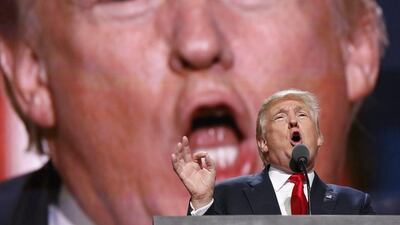ABU DHABI // The Republican US presidential nominee Donald Trump’s acceptance speech offered a contradictory vision of America’s role in the world and did little to address questions by Washington’s traditional allies about his commitment to the global security order it has led for decades.
Mr Trump portrayed a US under attack by terrorists and beset by violent immigrant criminals, and forced to carry an unfair burden abroad, while calling both for an isolationist foreign policy and a more muscular strategy with regional allies to destroy ISIL.
The divisive candidate spent a significant portion of his speech on the Middle East, laying the blame for everything from the rise of ISIL to the violent upheavals in post-Arab Spring countries on the decisions made by his Democratic rival, Hillary Clinton, during her tenure as secretary of state.
While some of his criticisms of Middle East policy under president Barack Obama echo sentiments among leaders in the Gulf, any points Mr Trump may have scored will have been critically undermined by his lack of detail and unpredictability as well as the underlying message of retreat. With no signs of a shift towards the political centre, his continuing xenophobia and attacks on Muslims will also colour the leaders’ views of his candidacy, and fears that he is fuelling the extremist narrative.
“Americanism, not globalism, will be our credo,” Mr Trump told the Republican convention on Thursday. “As long as we are led by politicians who will not put America first, then we can be assured that other nations will not treat America with respect – the respect that we deserve. The American people will come first once again.”
The speech on Thursday night followed an interview the New York Times on Wednesday in which Mr Trump said that under his administration the US would go to the aid of Baltic Nato member states if they were invaded by Russia only "if they fulfil their obligations to us". The remark fuelled outrage in Europe, and seemed to indicate that the foundation of the Nato treaty alliance – the mutual defence guarantee – may be ignored by a president Trump, who has called on allies from Europe to east Asia to pay more for their security partnerships with the US.
Beyond Nato, the message to Asia, and to US partners in the Gulf who have no alliance treaty with the US, is that they will be less secure and will have to rely less on Washington. The position will exacerbate concerns by GCC leaders who already feel the US is more ambiguous than ever before about its commitments to them. But even Mr Obama has said an invasion of a GCC country would be a US red line, and Mr Trump’s insinuation that such policies may have to be renegotiated will be deeply troubling, even though understood to be campaign rhetoric.
Mr Trump also said he would do away with free trade agreements the US has struck with blocs of countries. The GCC countries already prefer to engage bilaterally with the US, their most important ally and a major trade partner, and do not have multilateral trade deals with Washington, but an isolationist trade policy is unlikely to be viewed positively.
On fighting ISIL, Mr Trump said: “We must work with all of our allies who share our goal of destroying ISIS and stamping out Islamic terrorism and doing it now, doing it quickly. We’re going to win. We’re going to win fast.”
He offered no details of his strategy, but has said he would not commit significant numbers of US troops.
foreign.desk@thenational.ae

